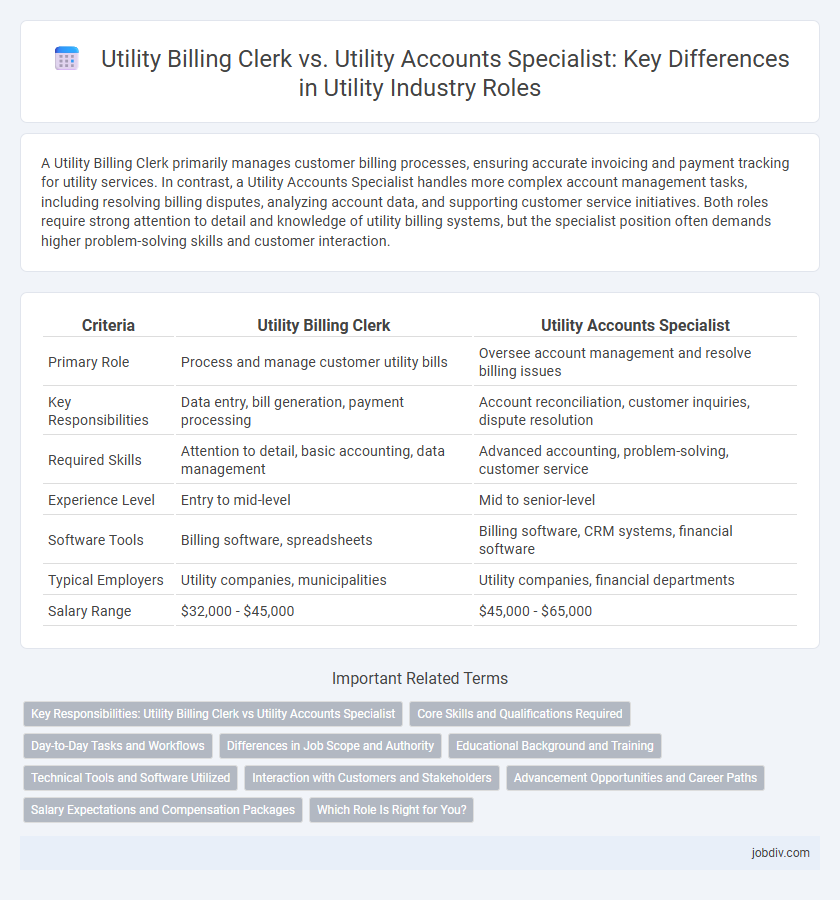A Utility Billing Clerk primarily manages customer billing processes, ensuring accurate invoicing and payment tracking for utility services. In contrast, a Utility Accounts Specialist handles more complex account management tasks, including resolving billing disputes, analyzing account data, and supporting customer service initiatives. Both roles require strong attention to detail and knowledge of utility billing systems, but the specialist position often demands higher problem-solving skills and customer interaction.
Table of Comparison
| Criteria | Utility Billing Clerk | Utility Accounts Specialist |
|---|---|---|
| Primary Role | Process and manage customer utility bills | Oversee account management and resolve billing issues |
| Key Responsibilities | Data entry, bill generation, payment processing | Account reconciliation, customer inquiries, dispute resolution |
| Required Skills | Attention to detail, basic accounting, data management | Advanced accounting, problem-solving, customer service |
| Experience Level | Entry to mid-level | Mid to senior-level |
| Software Tools | Billing software, spreadsheets | Billing software, CRM systems, financial software |
| Typical Employers | Utility companies, municipalities | Utility companies, financial departments |
| Salary Range | $32,000 - $45,000 | $45,000 - $65,000 |
Key Responsibilities: Utility Billing Clerk vs Utility Accounts Specialist
Utility Billing Clerks primarily manage the preparation, issuance, and processing of customer utility bills, ensuring accuracy in meter readings and payment records. Utility Accounts Specialists handle more complex account management tasks, including resolving billing discrepancies, managing account adjustments, and maintaining detailed financial records related to utility services. Both roles require proficiency in utility billing software and a strong understanding of customer service principles within the utility sector.
Core Skills and Qualifications Required
Utility Billing Clerks require strong attention to detail, proficiency in billing software, and excellent data entry skills to accurately process customer invoices and payments. Utility Accounts Specialists need advanced knowledge of account reconciliation, customer service expertise, and the ability to manage complex billing issues and disputes. Both roles demand strong communication abilities, familiarity with utility regulations, and competency in financial reporting systems.
Day-to-Day Tasks and Workflows
Utility Billing Clerks primarily handle the preparation, issuance, and processing of customer bills, ensuring accurate meter readings and resolving billing discrepancies. Utility Accounts Specialists focus on managing customer accounts, including payment plans, account adjustments, and handling escalated billing inquiries to maintain account accuracy. Both roles require proficiency in utility billing software and strong customer service skills to support efficient revenue collection and account management.
Differences in Job Scope and Authority
Utility Billing Clerks primarily handle the preparation and processing of customer bills, ensuring accurate meter readings and payment collection. Utility Accounts Specialists possess broader authority, managing account reconciliations, resolving complex billing discrepancies, and often overseeing customer account adjustments. The main difference lies in the scope of responsibility, with Specialists tasked with higher-level financial analysis and customer service issues than Clerks.
Educational Background and Training
Utility Billing Clerks typically require a high school diploma or equivalent, with on-the-job training emphasizing billing software and customer service skills. Utility Accounts Specialists often hold an associate degree or higher in accounting, finance, or business administration, coupled with formal training in utility regulations and advanced accounting principles. Both roles benefit from proficiency in utility management systems, but the specialist position demands deeper expertise in financial reporting and regulatory compliance.
Technical Tools and Software Utilized
Utility Billing Clerks primarily utilize billing software such as Oracle Utilities Billing and SAP Billing for generating and managing customer invoices. Utility Accounts Specialists often work with advanced financial systems like Microsoft Dynamics GP and specialized enterprise resource planning (ERP) tools to oversee account reconciliations and payment processing. Both roles require proficiency in customer relationship management (CRM) platforms and data analysis software to ensure accurate utility account management and reporting.
Interaction with Customers and Stakeholders
Utility Billing Clerks primarily handle customer inquiries regarding billing issues, payment processing, and account adjustments, ensuring accurate and timely resolution. Utility Accounts Specialists engage more deeply with stakeholders, including municipal agencies and vendors, to manage account reconciliations, audit financial data, and support complex billing disputes. Both roles require strong communication skills, but Utility Accounts Specialists often perform higher-level coordination and financial analysis related to utility services.
Advancement Opportunities and Career Paths
Utility Billing Clerks typically start with essential data entry and customer service tasks, providing a foundation for growth into Utility Accounts Specialist roles that emphasize account management and financial analysis. Career advancement often progresses from handling billing inquiries to managing complex accounts and supporting utility revenue operations, with specialist roles offering greater responsibility and potential access to supervisory positions. Utility Accounts Specialists also gain exposure to regulatory compliance and auditing, positioning them for further advancement into utility finance or management careers.
Salary Expectations and Compensation Packages
Utility Billing Clerks typically earn a salary ranging from $35,000 to $50,000 annually, with compensation packages often including basic health benefits and limited bonuses. Utility Accounts Specialists command higher salaries, generally between $50,000 and $70,000 per year, reflecting their advanced responsibilities in account management and customer service, along with enhanced benefits such as performance incentives and retirement plans. Salary expectations for both positions vary depending on geographic location, company size, and individual experience levels.
Which Role Is Right for You?
Utility Billing Clerks primarily handle invoice preparation, payment processing, and customer account maintenance, making this role ideal for individuals who excel in detail-oriented tasks and customer interaction. Utility Accounts Specialists manage more complex financial reconciliations, account analysis, and regulatory compliance, suited for those with strong analytical skills and experience in financial reporting. Choosing between the two depends on your proficiency in routine billing operations versus advanced account management and regulatory duties.
Utility Billing Clerk vs Utility Accounts Specialist Infographic

 jobdiv.com
jobdiv.com